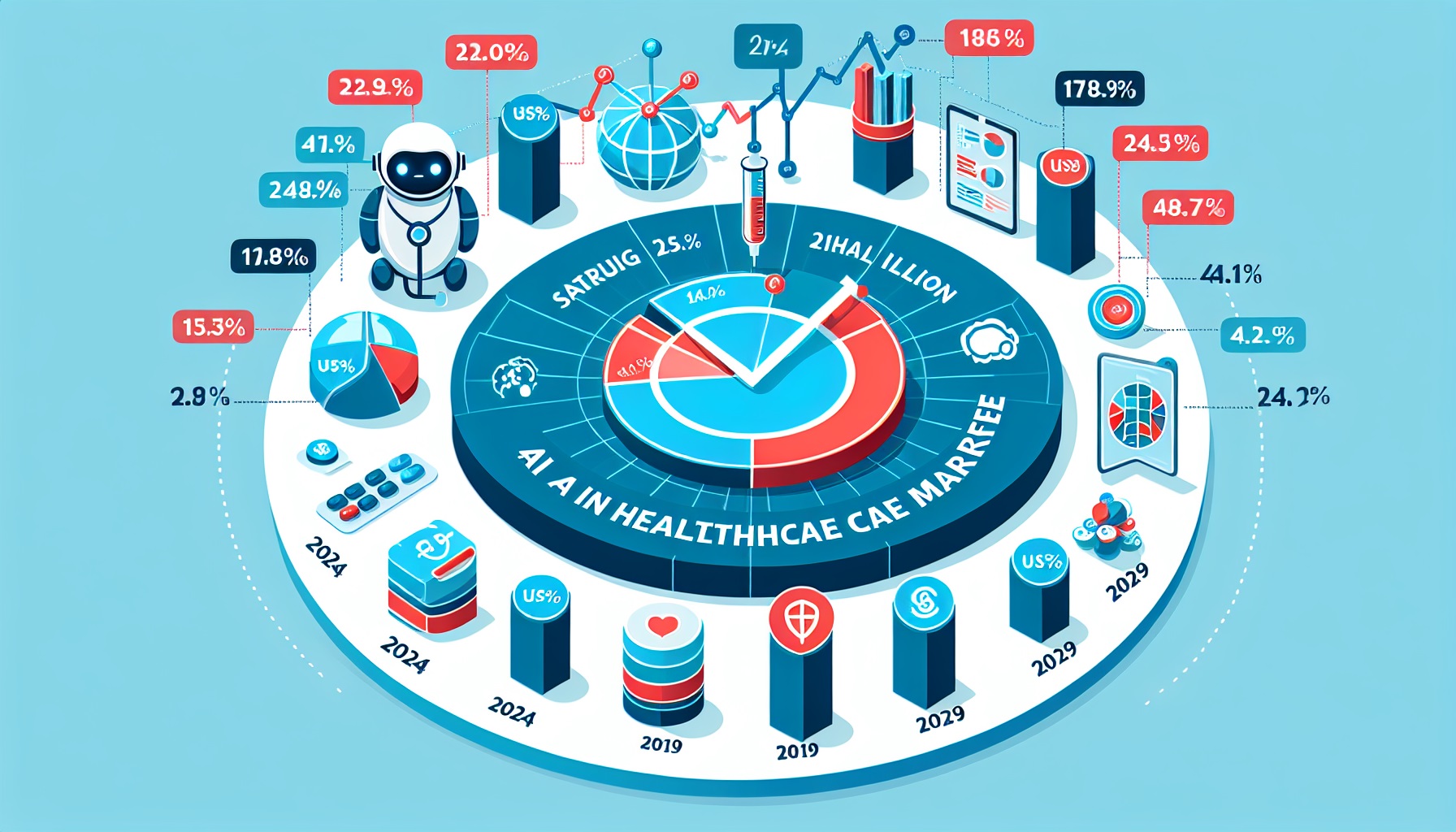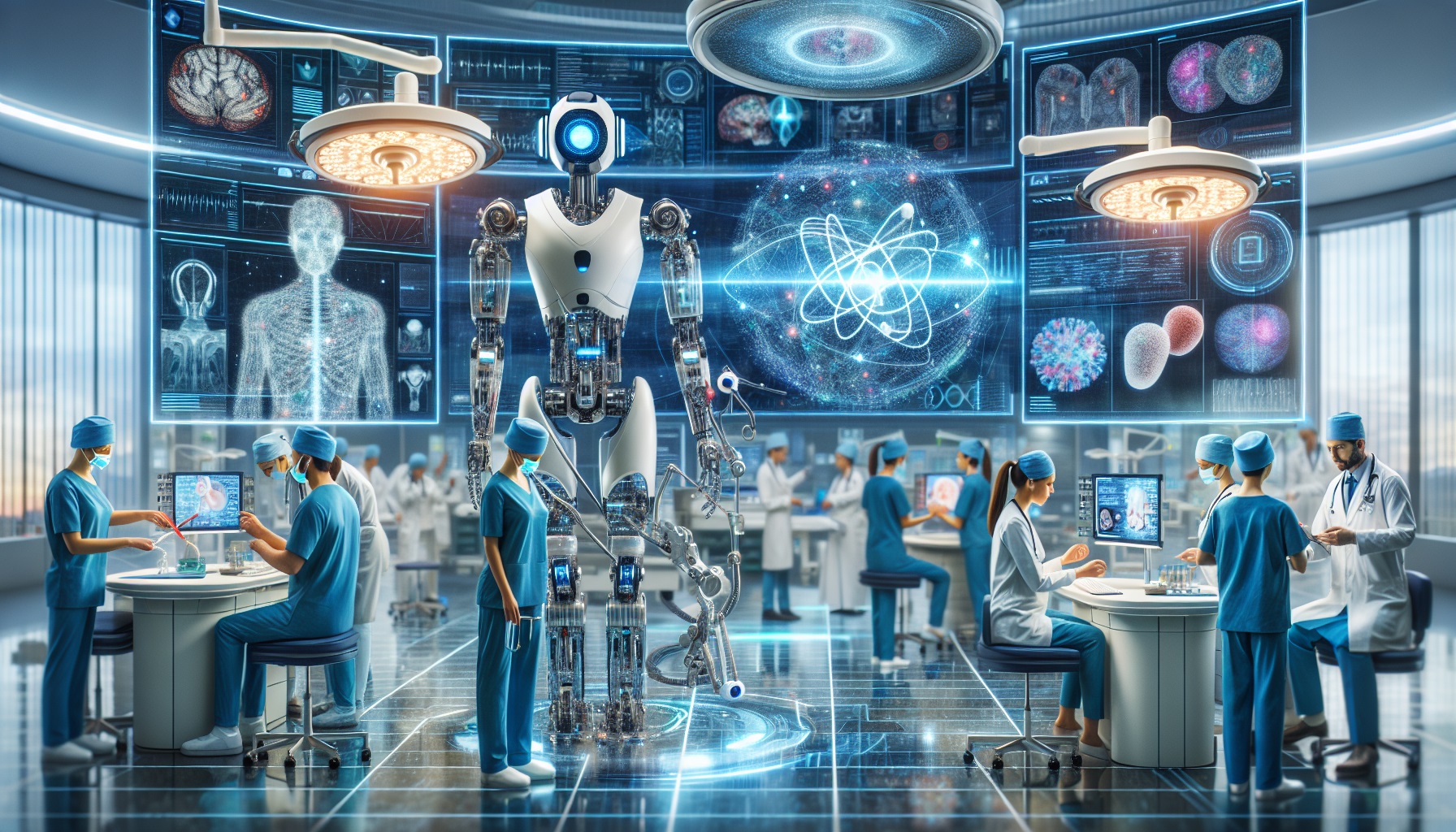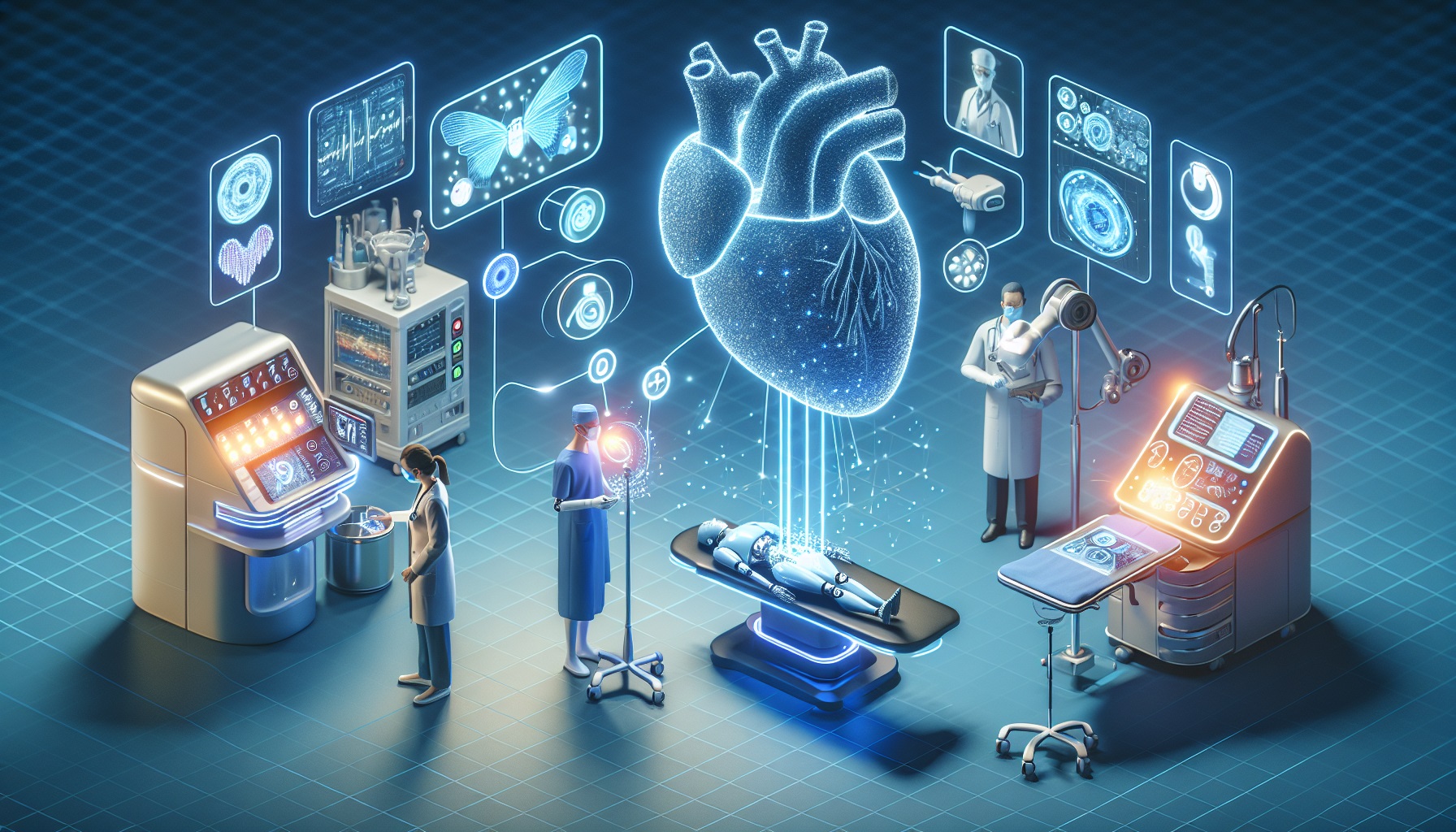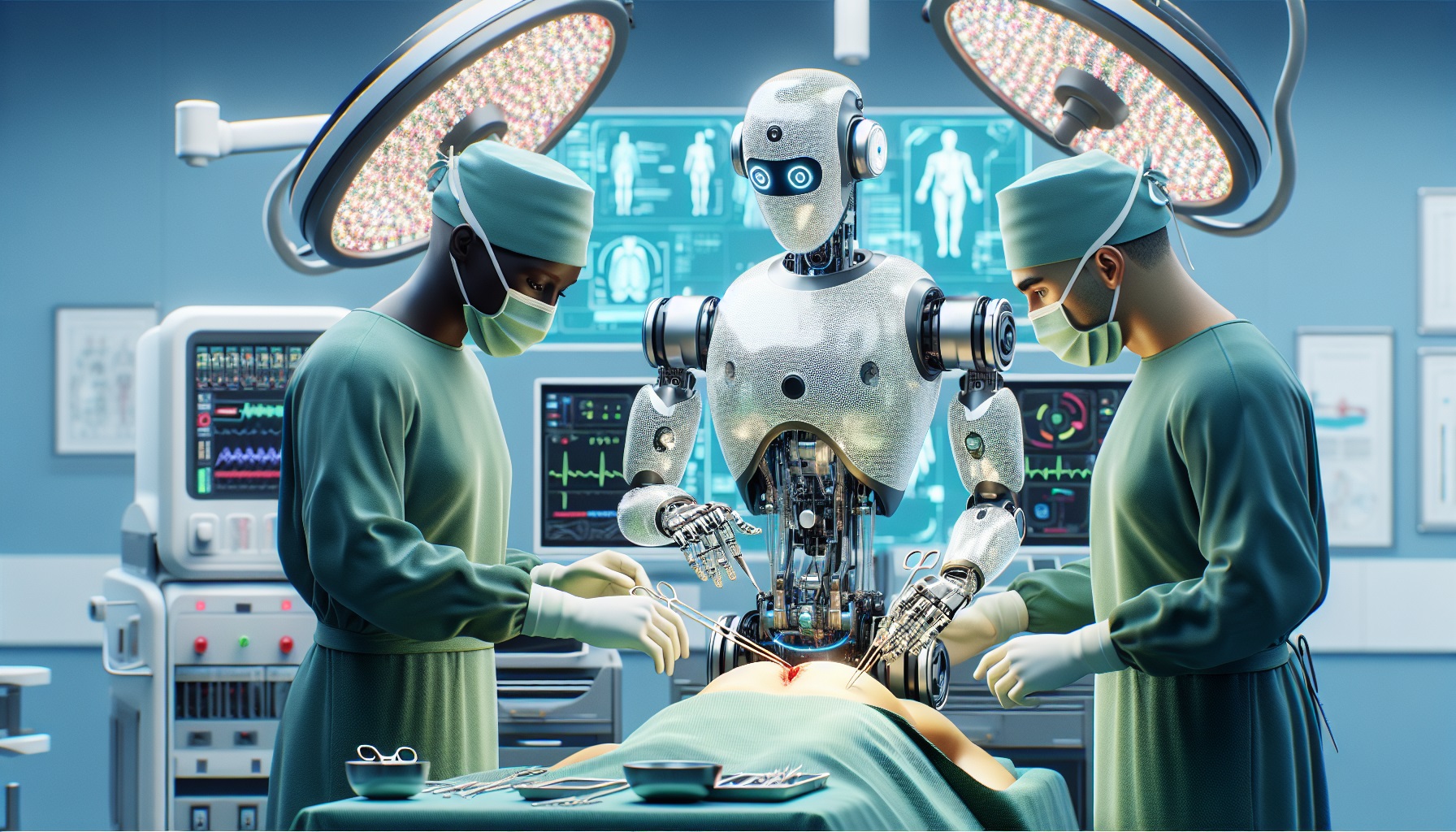The Role of AI in Healthcare: Current Trends and Future Prospects
Artificial intelligence (AI) is causing a revolution in healthcare, transforming the way medical professionals diagnose, treat, and manage patient care. As AI technologies continue to advance, they are reshaping the healthcare landscape, offering innovative solutions to long-standing challenges in the industry. The integration of AI in healthcare has an impact on various aspects, from improving diagnostic accuracy to enhancing treatment outcomes and streamlining administrative processes.

The use of AI in healthcare is growing rapidly, with numerous applications already in place and many more on the horizon. This article explores the current trends and future prospects of AI in healthcare, examining its role in areas such as medical imaging, clinical decision support, and precision medicine. It also looks at the benefits AI brings to the healthcare industry, including increased efficiency, reduced costs, and improved patient outcomes. By delving into the AI healthcare ecosystem, we aim to provide insights into how this technology is shaping the future of medicine and patient care.
Current Applications of AI in Healthcare
Artificial intelligence (AI) has an impact on various aspects of healthcare, revolutionizing the way medical professionals diagnose, treat, and manage patient care. AI encompasses technologies such as machine learning, deep learning, natural language processing, and robotics, which are being applied to enhance practitioner performance and improve patient outcomes.
Diagnostic Imaging
AI systems have demonstrated remarkable success in multiple medical imaging use cases. These systems can detect mitosis in breast cancer histology images, classify skin cancer with dermatologist-level accuracy, diagnose diabetic retinopathy from retinal fundus photographs, and predict cardiovascular risk factors from retinal images. In radiology, AI algorithms analyze chest radiographs to detect pneumonia with high sensitivity. These advancements assist healthcare providers in improving diagnosis and prognosis, offering more accurate and timely results compared to traditional methods.
Clinical Decision Support
AI-powered clinical decision support (CDS) systems are transforming the way healthcare professionals make decisions. In emergency departments, where quick and accurate decision-making is critical, AI-CDS tools streamline processes and optimize resource allocation. These systems analyze complex patient data to assess the severity of a patient's condition, ensuring timely and appropriate medical attention. AI-CDS also aids in risk assessment, predicting patient outcomes, and contributing to more informed decisions regarding patient disposition.
Drug Discovery
AI is revolutionizing drug discovery by significantly reducing the time and cost associated with traditional methods. AI tools are being used at various stages of the drug discovery process, from target identification to lead optimization. For instance, AI systems analyze large datasets to identify novel proteins and genes that can be targeted to counteract diseases. They also enable high-fidelity molecular simulations, reducing the need for physical testing of candidate drug compounds. Some AI systems can even generate promising and never-before-seen drug molecules from scratch, potentially leading to the development of innovative therapies.
AI Technologies Transforming Healthcare
AI technologies are revolutionizing the healthcare industry, offering innovative solutions to long-standing challenges. Three key AI technologies transforming healthcare are machine learning, natural language processing, and robotics.
Machine Learning
Machine learning, a type of AI that enables systems to learn from data and improve without explicit programming, has multiple applications in healthcare. It can expedite research and development timelines, support clinical decisions, and promote better patient outcomes. Machine learning algorithms can analyze vast amounts of medical data to predict disease outcomes, identify patterns in patient records, and assist in drug discovery.
One significant application is in medical imaging analysis. Machine learning models can detect malignant cells in microscopic images and identify diseases such as Alzheimer's, heart failure, and breast cancer. These capabilities enhance diagnostic accuracy and speed, potentially leading to earlier interventions and improved patient care.
Natural Language Processing
Natural Language Processing (NLP) is an AI field that enables machines to understand and communicate in human language. In healthcare, NLP has an impact on various aspects of patient care and administrative tasks.
NLP systems can analyze unstructured clinical notes, extracting critical data from electronic health records (EHRs) at the point of care. This technology helps healthcare providers quickly access relevant information, enabling more informed decisions. NLP also assists in clinical assertion modeling, allowing physicians to determine whether a patient is experiencing a problem and if it is present, absent, or conditional.
Furthermore, NLP contributes to medical coding efficiency. It can extract information about conditions and diagnoses from patient records and assign appropriate ICD-10 Clinical Modification codes, streamlining administrative processes and improving billing accuracy.
Robotics
Robotics in healthcare has advanced significantly, supporting various medical procedures and tasks. Surgical-assistance robots enhance existing surgical treatments, including minimally invasive and orthopedic surgeries. These robots provide surgeons with enhanced precision and control, leading to smaller incisions and faster patient recovery times.
Service robots perform routine logistical tasks in healthcare facilities, such as preparing patient rooms, tracking supplies, and transporting bed linens. This automation frees up healthcare professionals' time, allowing them to focus on patient care.
Social robots are increasingly used in long-term healthcare environments to interact with patients and visitors. These robots can encourage patients to follow treatment regimens, provide cognitive engagement, and support patient morale, contributing to overall care quality.
Benefits of AI in Healthcare
AI has a transformational impact on healthcare, offering numerous benefits that enhance patient care, improve operational efficiency, and support healthcare providers. The integration of AI technologies in various aspects of healthcare has led to significant advancements in diagnosis, treatment planning, and overall healthcare management.

Improved Diagnosis
AI technologies have revolutionized medical diagnostics, providing healthcare professionals with powerful tools to analyze complex medical data. Machine learning algorithms can analyze vast datasets, including medical images, patient histories, and genetic information, to identify patterns and anomalies that may be difficult for human experts to detect. This capability has an impact on various areas of diagnostics:
- Medical Imaging: AI algorithms can analyze X-rays, MRIs, CT scans, and other medical images with high accuracy, assisting radiologists in detecting abnormalities, fractures, tumors, and other conditions.
- Early Disease Detection: AI systems can predict the likelihood of developing certain diseases, such as diabetes or cardiovascular conditions, by analyzing patient data and identifying risk factors.
- Diagnostic Accuracy: Studies have shown that AI can outperform human experts in certain diagnostic tasks, such as detecting breast cancer in mammograms or identifying skin cancer from dermatological images.
Enhanced Treatment Planning
AI has an impact on treatment planning by enabling personalized and data-driven approaches to patient care. This leads to more effective interventions and improved patient outcomes:
- Personalized Treatment: AI algorithms can analyze patient-specific data to tailor treatment plans, considering factors such as genetics, medical history, and lifestyle.
- Drug Discovery: AI accelerates the drug discovery process by analyzing large datasets and identifying potential drug candidates, reducing time and costs associated with traditional methods.
- Clinical Decision Support: AI-powered systems provide real-time assistance to healthcare providers, offering evidence-based recommendations for treatment options and helping to optimize medication dosages.
Operational Efficiency
AI technologies contribute to improved operational efficiency in healthcare settings, streamlining administrative tasks and optimizing resource allocation:
- Administrative Tasks: AI can automate routine administrative tasks, such as scheduling appointments, managing electronic health records, and processing insurance claims, reducing the workload on healthcare staff.
- Resource Optimization: AI algorithms can predict patient demand, optimize staff scheduling, and improve resource allocation in healthcare facilities, leading to reduced waiting times and improved patient flow.
- Cost Reduction: By improving efficiency and reducing errors, AI has the potential to significantly reduce healthcare costs, with estimates suggesting savings of 5% to 10% of healthcare spending through AI implementation.
Future Trends in AI and Healthcare
The convergence of artificial intelligence (AI) and healthcare is poised to revolutionize patient care, offering innovative solutions to long-standing challenges. As technology advances, several key trends are emerging that have the potential to transform the healthcare landscape.

Precision Medicine
AI is driving the development of precision medicine, a holistic approach that integrates various technologies to tailor diagnosis, treatment, and ongoing monitoring for optimal patient outcomes. This approach combines advanced medical imaging, AI, and molecular diagnostics to provide personalized care. AI algorithms can analyze vast amounts of data, including genetic information, medical records, and imaging results, to offer clinicians data-driven insights. This enables healthcare providers to validate or alter treatment trajectories based on an individual's unique characteristics, moving away from one-size-fits-all approaches.
Predictive Analytics
Predictive analytics is reshaping healthcare by allowing professionals to make more effective and efficient operational and clinical decisions. By analyzing current and historical healthcare data, predictive models can identify patients at higher risk of specific conditions, enabling early interventions and prevention of deeper problems. For instance, these models can predict which patients with cardiovascular disease have the highest probability of hospitalization based on factors such as age, coexisting chronic illnesses, and medication adherence. This capability empowers healthcare providers to make timely, fact-based decisions, potentially reducing costs and improving patient outcomes.
AI-Powered Wearables
The integration of AI with wearable health devices is transforming patient and provider monitoring and management of health. These electronic companions are evolving beyond simple fitness trackers into indispensable tools for holistic well-being and chronic disease management. AI algorithms can analyze the vast amount of data collected by wearables to identify patterns, detect anomalies, and derive meaningful insights. For example, future wearables may include sensors for evaluating blood glucose levels, monitoring elevated blood pressure, and measuring breathing patterns during sleep. This continuous, real-time data collection can serve as an early warning system, alerting providers to potential health issues before they become critical.
Key AI Technologies in Healthcare
Artificial intelligence has ushered in a new era of computational medicine, revolutionizing various aspects of healthcare. Three key AI technologies transforming the industry are deep learning, computer vision, and natural language processing.

Deep Learning
Deep learning, a cutting-edge branch of machine learning, has an impact on medical image analysis, electronic health records, genomics, and drug development. This technology enables automatic learning of complex and robust features from raw data without the need for manual feature engineering. Deep learning models can analyze vast amounts of biomedical data, including structured and unstructured information from electronic health records, laboratory test results, diagnoses, and medications.
The computing capability of deep learning models allows for fast, accurate, and efficient operations in patient care, research and development, and insurance. These models can audit prescriptions against patient health records to identify and correct possible diagnostic errors or errors in prescription. Additionally, deep learning algorithms can identify viable drug combinations by rapidly processing genomic, clinical, and population data.
Computer Vision
Computer vision, a branch of AI that interprets and processes visual data, has demonstrated remarkable success in medical imaging applications. This technology enables machines to analyze medical images with high accuracy, often surpassing human performance. For instance, in object classification tasks, convolutional neural networks have achieved an error rate of about 3.5%, compared to the human error rate of 5%.
Computer vision excels in analyzing medical images such as X-rays, MRIs, and CT scans, identifying signs of diseases like cancers, fractures, or neurological disorders. It also aids in pathology by efficiently analyzing tissue samples and detecting cellular abnormalities indicative of conditions like cancer. In ophthalmology, computer vision algorithms analyze retinal images for early detection of eye diseases such as diabetic retinopathy and glaucoma.
Natural Language Processing
Natural Language Processing (NLP) has an impact on healthcare by enabling machines to understand and communicate in human language. NLP technologies extract relevant data from speech recognition equipment, significantly modifying analytical data used in value-based care and population health management efforts. This technology helps free clinicians from laborious physical systems of electronic health records, allowing them to invest more time in patient care.
NLP applications in healthcare include computer-assisted coding, clinical decision support, and clinical trial matching. It can analyze unstructured clinical notes, extracting critical data from electronic health records at the point of care. NLP also contributes to medical coding efficiency by extracting information about conditions and diagnoses from patient records and assigning appropriate codes.
AI-Powered Diagnostics and Imaging
AI has an impact on various aspects of medical imaging and diagnostics, revolutionizing the way healthcare professionals analyze and interpret medical data. This technology has applications in radiology, pathology, and dermatology, enhancing diagnostic accuracy and efficiency.
Radiology
In radiology, AI algorithms have demonstrated remarkable success in analyzing medical images such as X-rays, MRIs, and CT scans. These systems can detect abnormalities, fractures, tumors, and other conditions with high accuracy, often surpassing human performance. For instance, AI can analyze chest radiographs to detect pneumonia with high sensitivity. Computer vision excels in analyzing medical images, identifying signs of diseases like cancers, fractures, or neurological disorders.
Pathology
AI has transformed digital pathology, providing tools for faster, higher-quality, and accurate diagnosis. Machine learning algorithms can analyze whole slide images (WSIs) to distinguish between benign and malignant cancers. AI can also detect isolated tumor cells in lymph nodes suspicious for metastatic carcinoma, increasing sensitivity of detection in a time-efficient manner. Additionally, AI tools help standardize scoring criteria in several tumors, such as Gleason score for prostatic cancers or breast cancer grading.
Dermatology
In dermatology, AI has shown promising results in distinguishing benign lesions from malignant ones. Convolutional neural networks (CNNs) have demonstrated performance comparable to dermatopathologists in differentiating seborrheic keratosis from keratinocyte carcinoma and benign nevi from malignant melanoma. AI algorithms can analyze digital dermatoscopic images with similar diagnostic accuracy as humans in classifying pigmented skin lesions.
AI-powered diagnostics and imaging have the potential to improve patient care by providing faster, more accurate diagnoses and assisting healthcare professionals in making informed decisions. As these technologies continue to advance, they have the potential to transform the practice of medicine and enhance patient outcomes across various medical specialties.
AI for Patient Care and Management
The integration of artificial intelligence (AI) in healthcare has revolutionized patient care and management, offering innovative solutions to enhance the quality and efficiency of medical services. AI technologies have an impact on various aspects of patient care, from remote monitoring to personalized treatment plans and virtual health assistants.
Remote Monitoring
AI-powered remote patient monitoring (RPM) has transformed the way healthcare providers track and manage patients' health conditions. By leveraging wearable devices, sensors, and patient-reported information, AI algorithms analyze vast amounts of data to detect trends, anomalies, and potential health issues. This continuous monitoring enables early detection of health deterioration, especially for individuals with chronic conditions or those recovering from acute illnesses.
For instance, a patient with heart failure may use an AI-driven remote monitoring device that tracks their heart rate, blood pressure, and respiratory rate in real-time. The AI algorithm can detect irregular patterns in the patient's vital signs, signaling the possibility of an impending heart failure exacerbation. This early detection allows for timely intervention, potentially preventing complications and reducing the need for hospital readmissions.
Personalized Treatment Plans
AI brings a data-driven and holistic approach to tailoring treatment plans for patients. By analyzing comprehensive datasets, including medical history, genetics, lifestyle choices, and responses to previous treatments, AI algorithms generate insights that inform the creation of personalized care strategies. This approach considers each patient's unique characteristics, optimizing the likelihood of treatment success and patient satisfaction.
For example, a patient with diabetes may utilize an AI-powered remote patient monitoring system that tracks their blood glucose levels, physical activity, and dietary habits. Based on this data, the AI algorithm recommends personalized meal plans and exercise routines, leading to better glycemic control and reduced risk of complications.
Virtual Health Assistants
AI-enabled virtual health assistants have emerged as valuable tools in patient care and management. These digital assistants can handle a variety of tasks, from scheduling appointments to providing personalized health education and answering medical queries. Virtual health assistants enhance patient engagement and empower individuals to take an active role in managing their health conditions.
A patient diagnosed with hypertension may use an RPM blood pressure monitor and AI-driven mobile app. The devices work together to monitor the patient's blood pressure and stress levels regularly. The app's virtual assistant can educate the patient about the impact of lifestyle choices on blood pressure and offer personalized tips to reduce stress, enabling patients to manage their condition and improve overall well-being.
AI-Driven Precision Medicine
AI has an impact on precision medicine by analyzing vast amounts of data to provide tailored treatments and predictive diagnostics. This approach combines multi-omics profiles with epidemiological, demographic, clinical, and imaging data to enable more effective and cost-effective personalized treatment.
Genomic Analysis
AI-powered genomic analysis has revolutionized the field of precision medicine. Machine learning algorithms can identify patterns in DNA sequence data and molecular pathology imaging protocols. This capability has an impact on genetic diagnosis, allowing for faster and more accurate identification of disease-causing variants. For instance, AI-based techniques have been used to analyze gene expression data to predict patient responses to chemotherapy, showing encouraging outcomes across multiple drugs.
Personalized Treatment Selection
AI has an impact on personalized treatment selection by integrating diverse data modalities, including genomics, transcriptomics, metabolomics, and proteomics. These systems can analyze drug screening data to determine if existing drugs or compounds have activity against specific therapeutic targets. AI-driven tools for clinical decision support assist physicians in selecting treatments that are most likely to be effective for individual patients. For example, AI can help identify potential compounds impacting a target and reveal insights into how drugs may affect various structural and functional features of a cell.
Disease Risk Prediction
AI-powered systems have demonstrated promising outcomes in forecasting disease risk with increased precision. By analyzing complex biological factors, AI aids in identifying novel therapeutic targets and predicting potential health issues. For instance, AI-enabled recognition of phenotype features through electronic health records or images, matched with genetic variants, allows for faster genetic disease diagnosis. This capability has an impact on early detection and prevention strategies, potentially leading to more effective interventions and improved patient outcomes.
AI in Medical Imaging and Diagnostics
AI has an impact on medical imaging and diagnostics, revolutionizing the way healthcare professionals analyze and interpret medical data. This technology has applications across various medical specialties, enhancing diagnostic accuracy and efficiency.
Image Recognition and Analysis
AI-powered image recognition has transformed the analysis of medical images, including X-rays, MRIs, CT scans, and echocardiograms. Machine learning models, such as convolutional neural networks (CNNs), have demonstrated remarkable success in interpreting these images. For instance, algorithms can analyze mammogram images to detect tumors or abnormal patterns with 94% accuracy. Google's AI model for detecting breast cancer in mammograms showed a reduction of 5.7% in false positives and 9.4% in false negatives compared to human radiologists.
In cardiology, AI algorithms have been developed to interpret cardiac MRI, CT scans, and echocardiograms. A study by Hannun et al. in 2019 found that deep neural network models outperformed cardiologists in diagnosing electrocardiogram (ECG) abnormalities and arrhythmias, achieving an average area under the receiver operating characteristic curve of 0.97.
Early Disease Detection
AI has demonstrated significant potential in early disease detection across various medical conditions. In lung cancer screening, a computer was able to find tumors in scans with more accuracy than professional radiologists, correctly detecting early stages of lung cancer 94% of the time. Similarly, AI tools can examine CT scans to detect early-stage tumors in other organs.
In neurology, machine learning can analyze brain imaging data to detect early signs of diseases like Alzheimer's, even before symptoms become apparent. AI can also analyze voice data and hand movements to detect early signs of neurological conditions. For cardiovascular diseases, AI-powered wearable devices can monitor vital signs and predict the immediate and long-term risk of stroke and heart attacks.
Diagnostic Accuracy Improvement
AI has shown promise in improving diagnostic accuracy across various medical specialties. In pathology, a study involving 8,803 participants found that machine learning achieved an accuracy of 0.98 in colon cancer identification, compared to 0.969 for human pathologists. AI algorithms have also demonstrated high accuracy in detecting arrhythmias from ECG data and predicting heart failure based on patient health records and test results.
In ophthalmology, AI can analyze retinal images for early detection of diseases like diabetic retinopathy. The technology has also shown potential in dermatology, differentiating between benign moles and malignant melanomas by analyzing skin images. These advancements in AI-driven diagnostics have the potential to enhance the efficiency and accuracy of medical diagnoses, ultimately leading to improved patient outcomes.
AI for Clinical Decision Support
AI has revolutionized clinical decision support systems (CDSS), enhancing their capabilities to process and interpret vast amounts of healthcare data with unprecedented speed and accuracy. These systems leverage machine learning, natural language processing (NLP), and deep learning to provide valuable insights and assistance across various facets of medical practice.
Evidence-Based Recommendations
AI-driven CDSS empowers healthcare professionals by offering evidence-based recommendations. By analyzing diverse patient data, including genetic profiles, medical histories, and treatment outcomes, AI algorithms can identify optimal treatment strategies that maximize efficacy and minimize risks. This approach enables personalized medicine, tailoring medical care to individual patients based on their unique characteristics.
Real-Time Data Analysis
Real-time healthcare analytics has an impact on operational efficiency and patient care. AI systems can ingest large amounts of aggregated data from electronic health records (EHRs), including progress notes and nursing notes, to provide useful insights. These systems can detect minor changes in a patient's condition as they happen, highlighting individuals who need to be prioritized due to deteriorating health.
For example, the Medical University of South Carolina uses real-time data from EHRs and machine learning algorithms to create classifiers that identify when a patient's health worsens due to sepsis. This combination of AI and real-time analytics has shown to increase early detection of sepsis by up to 32%.
Treatment Optimization
AI algorithms contribute to treatment optimization by analyzing patient-specific data and providing personalized dosing recommendations. CURATE.AI, an AI-derived personalized medicine platform, offers physicians support in making dosing decisions tailored to each patient's profile. This system maps the relationship between intervention intensity and phenotypic results for an individual based exclusively on that individual's data.
As a patient's health status or treatment changes, the CURATE.AI profile is recalibrated to ensure the most optimal care throughout the course of treatment. This approach differs from traditional CDSS platforms by using only a patient's own data to mediate their treatment, rather than relying on population-derived big data.
AI in Robotic Surgery and Assistance
AI has revolutionized robotic surgery and assistance, enhancing surgical precision and patient outcomes. This technology has an impact on various aspects of surgical procedures, from planning to post-operative care.

Surgical Planning
AI algorithms analyze vast amounts of patient data, including medical histories and imaging results, to assist surgeons in developing personalized treatment plans. These systems can predict patient outcomes after procedures like joint replacements, allowing for tailored care strategies. AI-powered platforms also contribute to the creation of 3D models derived from CT scans, which can be overlaid onto the surgeon's field of view during operations.
Intraoperative Guidance
During surgeries, AI-driven systems provide real-time decision support to surgeons. For instance, in colonoscopies, AI can identify potential polyps with high accuracy. Based on its analysis of millions of surgical videos, AI can anticipate the next 15 to 30 seconds of an operation, offering additional oversight. In laparoscopic cholecystectomies, AI overlays on video screens suggest safer areas for operation. These systems can also guide surgeons if they lose orientation during a procedure.
AI-powered robotic systems are capable of performing simple tasks, such as closing port sites and tying sutures. In some cases, AI has even demonstrated the ability to perform laparoscopic surgeries without human assistance, as evidenced by the successful reconnection of pig intestines at Johns Hopkins University.
Post-Operative Care
AI plays a crucial role in managing post-surgical care. Intelligent care enablement platforms use conversational AI to support patients through complex clinical episodes. These systems remind patients about medication adherence, provide information about care plans, and address routine uncertainties related to treatment. AI-equipped technology also collects data on social determinants of health, helping to identify and address barriers to completing post-surgical care steps.
The Future of AI in Healthcare
AI has an impact on various aspects of healthcare, promising significant advancements in patient care, diagnostics, and treatment. As AI technologies continue to evolve, they have the potential to revolutionize the healthcare industry.
Emerging Technologies
AI-driven precision medicine is expected to transform healthcare delivery. By analyzing vast amounts of patient data, including genomic, proteomic, and metabolomic information, AI algorithms will enable personalized treatment plans tailored to individual patients. This approach has the potential to improve patient outcomes and reduce healthcare costs.
Potential Breakthroughs
AI has the potential to accelerate drug discovery and development processes. Companies like Atomwise are using AI to predict the effectiveness of molecules against specific diseases, potentially reducing the time and costs associated with traditional drug discovery methods. This could lead to faster availability of groundbreaking treatments and therapies.
Long-Term Impact
In the long term, AI is expected to enable a shift from reactive to proactive healthcare. AI systems will likely become more intelligent, allowing for AI-augmented healthcare and connected care. This could lead to a preventative, personalized, data-driven disease management model that achieves improved patient outcomes in a more cost-effective manner.
The integration of AI in clinical practice is expected to augment human clinicians rather than replace them. Healthcare professionals will leverage AI to provide safer, standardized, and more effective care, potentially using "digital twin" models of patients to test interventions before applying them in real-world scenarios.
The AI Healthcare Ecosystem
The AI healthcare ecosystem is rapidly evolving, with key players and stakeholders shaping its trajectory. Big tech giants like Google, Microsoft, Amazon, and Apple are actively pursuing opportunities in this market. Google, through its subsidiary DeepMind, focuses on pharmaceutical R&D, radiology, and imaging. Microsoft leads in health IT services, with Azure Cloud becoming a prominent environment for provider-focused software. Amazon offers HIPAA-compliant cloud services and is involved in precision medicine and care delivery. Apple dominates the wearable device market, utilizing iPhones and Apple Watches for patient data collection.
The global AI in healthcare market was valued at USD 20.9 billion in 2024 and is projected to reach USD 148.4 billion by 2029, growing at a CAGR of 48.1%. North America currently dominates the market, followed by Europe, with countries like Germany, the UK, and France focusing on R&D and biotechnology drug discovery. The Asia-Pacific region is experiencing rapid growth, driven by an aging population and increased medical tourism.
Investment trends in AI healthcare are robust, with venture capital deal activity surging in recent years. In 2023, USD 7.20 billion of U.S. VC dollars were invested in AI healthcare companies, representing 21% of total VC healthcare investment. Administrative AI, including virtual assistants and clinical note-taking, accounts for 60% of total AI investment in healthcare since 2021. Patient diagnostics, particularly in imaging, has seen significant growth, with investment doubling since Q1 2021. Despite projections of fewer funds closing in 2024, total funds raised are expected to reach USD 16.90 billion, surpassing previous years.
FAQs
What role does AI play in the future development of healthcare?
AI is increasingly integral to healthcare, enhancing outcomes through improved clinical trials, diagnostics, treatments, self-care management, and personalized healthcare services.
What are the future possibilities for AI in the healthcare sector?
AI has diverse applications in healthcare such as streamlining claims processing, managing clinical documentation, optimizing revenue cycles, and handling medical records. Additionally, AI is being used in chatbots for patient interactions, mental health services, and telehealth solutions.
What is the current trend of AI utilization in healthcare?
Currently, AI is primarily employed to enhance the speed and accuracy of various healthcare processes. This includes the use of AI algorithms to analyze medical imaging data like X-rays, MRIs, and CT scans, aiding healthcare professionals in making faster and more accurate diagnoses.
What are the latest trends and future directions in AI research?
Recent trends in AI include intelligent process automation, a focus on cybersecurity, personalized services, automated AI development, autonomous vehicles, facial recognition technology, and the integration of IoT with AI. Notably, AI's role in healthcare is a significant part of these developments.
Related Reports:
Artificial Intelligence (AI) in Healthcare Market by Offering (Hardware, Software, Services), Technology (Machine Learning, Natural Language Processing), Application (Medical Imaging & Diagnostics, Patient Data & Risk Analysis), End User & Region - Global Forecast to 2029
Contact:
Mr. Rohan Salgarkar
MarketsandMarkets™ INC.
1615 South Congress Ave.
Suite 103
Delray Beach, FL 33445
USA : 1-888-600-6441
sales@marketsandmarkets.com
This FREE sample includes market data points, ranging from trend analyses to market estimates & forecasts. See for yourself.
SEND ME A FREE SAMPLE





